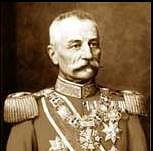
Monarchy Efforts in Serbia
The Monarchist Initiative (M.I.) is a non-government, non-commercial and non-political organization, established on 26 May 2006, and listed in the Register of Associations, NGOs and Political Organizations of the Ministry of Public Administration and Local Self-Government of Serbia.
The goals of M.I. are:
- to give unity to supporters of constitutional parliamentary monarchy, enabling them to meet and contact other monarchists;
- to promote information about and encourage interest in monarchy, monarchies, and royalty;
- to generally educate the public on these subjects;
- to advance the political theory, history, and philosophy of monarchy;
- to further promote and defend the idea of modern constitutional parliamentary monarchy as a superior governmental form;
- to cause to be written, published, and distributed accounts, records, information, and news of monarchy and royalty;
- and to work for the re-establishment of constitutional parliamentary monarchy – the Kingdom of Serbia. (http://monarchists.blogspot.com)
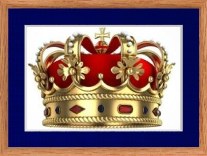
The following quotes are from a slide show promoting monarchy from the above website. (See:http://docs.google.com/Present?docid=ds7f9jx_289c2nsg5fp
“Monarchy is the best, the most realistic and the most practical option for Serbia. . . . Not a monarchy in some outdated form, but the type which exists in the northern European countries, like Sweden. For me, it simply has a nice sound to it – the Kingdom of Serbia.” — Dušan Kovacevic
“Re-establishment of monarchy would be followed by establishment of much better relations with the international community . . . because its head of state [King Alexander II] would be someone who knows the world, and who is known in the world.”
— Prof. Dr. Milorad Pavic
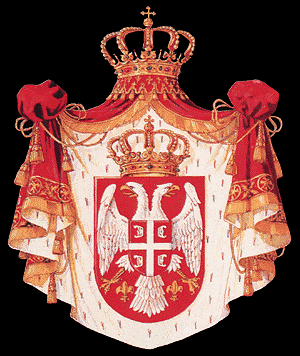
“European monarchies have excellent records of democracy and preserving freedom. . . . Most countries which have switched from a parliamentary to a presidential system, including most former British territories in Africa, have gone on to severely restrict political freedoms soon afterwards. . . . parliamentary systems are more stable, more effective, and better able to preserve freedom than executive presidencies, and some of the best examples of effective parliamentary democracies are constitutional monarchies. . . . Better governance is only one advantage of restoring the monarchy.
Monarchy separates politics from government: in that sense it is the opposite of totalitarianism which deliberately pretends that the interests of the ruling elite are those of the country. In a monarchy it is clear that you can be loyal to the state without being loyal to the government: a distinction which Communism does not recognize.” — Quentin Langley
“The Crown stands above the divisions and does not lower itself to the street; it represents the principle of stability, not games in the power struggle. The Crown does not enter political and party competition. . . .” — Prof. Dr. Predrag Palavestra
“Not only monarchy has the undisputable long history and exceptionally important role in the development and progress of Serbian state, but it also has doubtless advantages in the present and in the immediate future. . . .
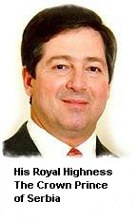
A monarch, who is the symbol of the state, its supporting pillar, represents the nation’s entity and his reign is not subjected to the mentioned election tests. By his very personality, his descendance, his reputation and his natural connections with other monarchs and other heads of states in the world, a monarch has greater weight than any other politician who managed to get enough votes.” — Prof. Dr. Slobodan Vitanovic
Dragomir Acovic, a Privy Council member of Serbia, wrote the following:
If the citizens of Serbia were asked about it, I believe the majority would support the coronation of the king. Regrettably, it depends on those who consider themselves to be the political elite of Serbia. Year after year our initiative to proclaim the Crown Prince a king has been clashing with stupid platitudes purporting how that would not be in accordance with the laws of democracy. These efforts fail not because they lack initiative or practicality, but because they are faced with the captive minds.
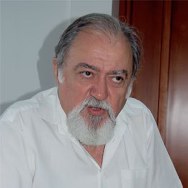
Listening to the rhetoric of our most vociferous champions of republicanism one can only conclude that monarchy is by definition backward and anachronic compared to republic, thus the supporters of „this“ and opponents of „that“ cannot accept the possibility of „this“ taking as a model something from „that“. There is still a terrible ideological charge in our society, and, to make it worse, a good proportion of the population is totally unaware of it. Those attitudes have become axiomatic and as such are never questioned, nor given a second thought.
One of the key differences between monarchy and republic is that, unlike a president who is often chairman of a political party and who is temporarily promoted to the post by a portion of the electorate, because it is larger or for any other reason, against the will of another portion of the electorate, and thus accordingly must have certain preferences towards his party and those who elected him, a monarch simply excludes such possibility, or there is no monarchy. Otherwise he is a lifelong president, or, in an extreme situation such as in Haiti or North Korea, a lifelong hereditary president of republic. That is the last thing on Earth that would come to mind to the Crown Prince or to any of his advisors.
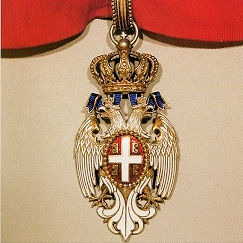
It is only natural that the expense of maintaining the Royal Compound in Dedinje is financed from the state’s budget, for whether one likes it or not, the state is its owner. The owner has always and under all regimes been responsible for covering the expenses of his property. Before the Crown Prince moved into it, all the operating expenses had been covered by the state. It had been like that when Josip Broz lived there, and in Miloševic’s time, too. The expenses are almost the same regardless of whether somebody lives there or not, because the Compound has to be maintained. But if one says that something is expensive, one should first ask oneself how much what one already has cost: how much the presidential elections cost, how much the changing presidential administrations cost, how much the consequences of what one has cost, and only then should one ask for the estimate of how much the alternative to all of that would cost. Surprisingly, not one of those who now keep asking how much the monarchy would cost has raised his or her voice to ask how much the republic had cost. Who do you think had paid for the famous inventory of Mr. Broz, that was made after his death and that included 42 or 43 residencies?
Allegations that the issue of monarchy is dividing the people in Serbia are an unscrupulous hogwash. I often ask myself if those who make them are trying to say that the people are divided today because we have had monarchy since 1945? Who’s crazy here? Excuse me, but this country has experienced secession during the hardcore republican ideological and political system. It was rejected as a homeland even by the ethnic minorities that were promoted by the very republican system. (http://docs.google.com/Doc?id=ds7f9jx_116gr8799ht)